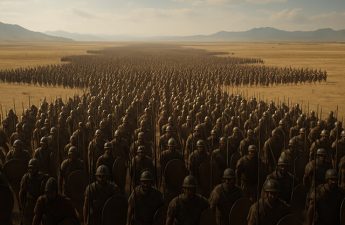It’s tough when we “know too much” about especially dark or heavy topics, spiritual or otherwise. “King Asa’s Prayer” touches on this idea. Let’s say we’ve researched, know enough to make a court case, know at least some of what could/should be believed or done—and not. But those around us don’t seem to get it, won’t listen, pooh-pooh us, don’t care. We can’t help feeling overwhelmed, wondering whether we can trust anyone, moaning “What’s wrong with everybody? What can I do? Why can’t they see…?” We want to grab people by the shoulders and shake them into reality. Yes, it’s very heavy.
Enter Ecclesiastes 1:18: “With much wisdom comes much sorrow; the more knowledge, the more grief.” Whoa!
When I reread my old copy of Hunt and McMahon’s book The Seduction of Christianity, I saw so many crucial spiritual warnings—the details of which I now understand but had NOT realized back in the 1980s. My stomach knotted up as I imagined what those writers must have felt at the time. They “knew too much” and were surely frustrated by Christians who didn’t get it, wouldn’t listen, saw no need to warn friends.
Maybe they felt like what I describe in my “Mysticism… 10 Things” handout, under point #3, when you learn more and more about something dangerous but no one else seems concerned: “During one wild moment, you’re afraid you might be in that movie with the pod people.” Ha!
Of course, it is good to study, use logic and reason, seek out the truth, and apply wisdom. The Bible applauds these things:
- “Do your best to present yourself to God as one approved,… who correctly handles the word of truth.” (2 Timothy 2:15)
- “The holy Scriptures… are able to make you wise for salvation through faith in Christ Jesus. All Scripture is God-breathed and is useful… so that the man of God may be thoroughly equipped for every good work.” (3:15, 16)
- “Though by this time you ought to be teachers, you need someone to teach you the elementary truths of God’s Word.” (Hebrews 5:12)
The writer of Ecclesiastes says, “I have grown and increased in wisdom…. I have experienced much of wisdom and knowledge” (1:16, 17). But he also warns that “more grief” will follow those (verse 18).
Matthew Henry’s 1700s commentary agrees, saying of this passage: “Those that increase knowledge have so much the more quick and sensible perception of the calamities of this world. Let us not therefore be driven off from the pursuit of any useful knowledge, but put on patience to break through the sorrow of it….”
Another source said, “Knowledge in the mind of a man cannot make the crooked world straight. In fact, great knowledge, when placed against the background of this world’s crookedness, becomes a source of great sorrow and pain” (Nelson’s The Complete Bible Commentary).
Adding knowledge upon knowledge won’t fix the problems, but it will increase our sorrow.
Not only that, the whole book of Ecclesiastes shows that “what has been will be again, what has been done will be done again; there is nothing new under the sun” (1:9). So there will always be good and evil, concern and disinterest, perception and shallowness…
That’s heavy.
But we are not helpless, or without direction. Matthew Henry’s commentary on Ecclesiastes 1:18 continues: “Let us [expect to find true happiness] only in the knowledge of God and the careful discharge of our duty to him.” Wow. Let that soak in.
The book of Ecclesiastes ends with “the conclusion of the matter: Fear God and keep his commandments, for this is the whole duty of man” (12:13, 14). Remember that this meaning of “fear” isn’t about dread/terror, but about reverence/respect. Chuck Swindoll puts that conclusion this way: “The answer is a life that is lived in connection with the living Lord. Only through Him can there be meaning.” (Living on the Ragged Edge, p. 26) And God will ultimately make everything right.
So yes, we all have subjects we “know too much” about, situations that make us feel helpless/overwhelmed/afraid. But believers have a solution (“the conclusion”) that we need to remember, focus on, and also share with others. After all, there’s a peace, a confidence, when the most important thing is intact—no matter what else is messed up. Matthew Henry said “our whole comfort is bound up in” that Ecclesiastes conclusion.
Thank you, Lord!



